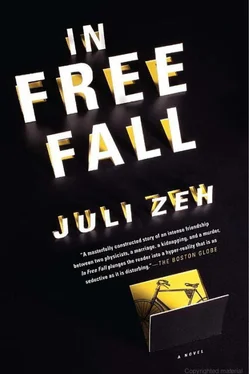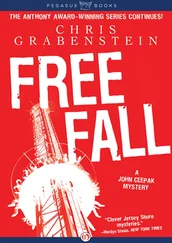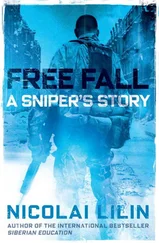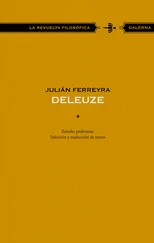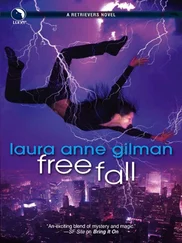“Look, Daddy! The lake is throwing itself up into the air!”
The spray soaks their clothes. It is warm.
The detective is looking at a holiday snap, a postcard like the ones on his fridge. But there is one essential difference. The other side of this particular card is not blank. There is writing on it: “It’s fantastic!” or “We were here!”
Schilf decides to take this card with him. Sebastian would certainly not object. A man, a woman, and a happy child. He will hang it over the hole in the story of his life. A life is so fragile. Something lurches out of its tracks, and instead of three people there is one, and only half of that person, too. The detective had practiced remembering for a while, then he had trained himself to forget. It had been unbearably sad to think about the life of his that had ended. Now he realizes that there is nothing easier than calling another person’s past to mind.
Anyone who wants to die has to be whole, the detective thought , the detective thinks.
Oskar speaks in the room somewhere behind him. “Knowing Sebastian has taught me to fear the whims of the gods.”
Schilf has closed his eyes. His fingers close around the edge of the windowsill as if holding on to the crow’s nest in a storm-tossed ship.
“Yesterday, I would have claimed to know one thing for certain,” Oskar says. “That I would give my life for him.”
“And today?” Schilf asks through clenched teeth.
“Today I am an old man.”
Oskar takes a breath. When he speaks again, his voice is even deeper. Cold.
“Did you know that Sebastian was with me yesterday evening?”
“I suspected it.”
“I asked him to leave the country with me.”
“And he refused?”
“He turned down everything that I had to give. It seems that he has finally made his decision. I can do nothing more for him.”
“You’re wrong, Oskar. You will do something for him. I promise you that.”
When the detective opens his eyes, the city has returned to its former self. It is night and there is no man, no woman, and no happy child. Even the pillar of water from the Jet d’Eau cannot be seen from here. Only the stubborn wind is still there, rattling the beams of the roof. Schilf turns around. Oskar is standing in front of him with his arms stretched out, as if he wants to embrace him. The detective would take a step backward if it weren’t for the pitched roof behind him, and behind that an abyss, a free fall. Their eyes meet.
There is a wave of human scents. Starched cotton, expensive aftershave, and a strange happiness. An arm is draped across the detective’s shoulders. Oskar pulls him close.
“Come. Let me help you.”
He conducts the detective back to the sofa, nudges his head onto the armrest, and presses something cool and moist to his neck. When Schilf looks down at himself, he sees a large red patch decorating his chest. He touches his face: nosebleed. There are flecks of red on Oskar’s white cuffs.
“I’ve messed up your shirt,” the detective says.
“Anyone wearing a white shirt is a doctor.” Oskar wipes the blood off his hands and passes the wet cloth to Schilf. “That’s what I thought when I was a child, anyway.”
“You’ve helped me a good deal.” The detective tries to sit up, but falls back down again. “Will you do me another favor?”
Lying down, he gropes in his back pocket for the chess computer. When the display lights up, Oskar kneels down next to the sofa.
“What have we got here?”
He looks at the sixty-four squares intently. Schilf knows exactly what he sees: a catastrophic situation in which everything that is still alive is pressing into one half of the playing field. Oskar scrutinizes the screen for a long time before he looks up.
“Interesting,” he says. “You’re playing black against the computer.”
“Certainly not,” Schilf says. “I’m white.”
Oskar knits his brows and looks at the game again.
“I repeat, Detective,” he says. “You’re an unusual person. You seem to love destroying yourself for the narrow chance of victory. Did you mean to tell me something with this game?”
Schilf shakes his head in which a slowly cooling mass rolls from side to side. He passes Oskar the stylus.
“You want me to finish this thing for you?” Oskar twirls the stylus in his fingers. “You want to watch me win this game for you?”
Schilf does not answer. Oskar strokes his chin and looks around. Finally he puts the chess computer on the detective’s stomach and props him up so that he can see the display.
“The knight goes here. The black queen is forked, and now your castle can move.” The stylus taps the display. Every move jiggles the small chess computer against the detective’s shirt buttons. “The pawn reaches the final row and is converted. Check. The king has to move. The rook moves in next to him. Et voilà .”
Congratulations , the screen flashes.
“The black king is mated,” the detective says.
“Yes,” Oskar says. “Mated.”
“You’re a genius.”
“Don’t tell me that this wasn’t planned.”
“I’ve only been playing for four weeks.”
“In that case,” Oskar says, squinting as if he is trying to focus on a particular point behind Schilf’s forehead, “it is most certainly you who are the genius. Can you get up now?”
Schilf wipes his face one more time and gives the cloth back to Oskar. With one hand on Oskar’s shoulder, he gets up. When they are standing in the middle of the room, he reaches for the cord hanging from the crow’s stomach.
“That’s been broken for a long time,” Oskar says.
In the hall, Schilf puts on his shoes but leaves the laces untied. Oskar has tugged the front door open over the rugs, and is holding it for him.
“I think you know everything that you need to know,” he says.
The smile they exchange in farewell is tinged with mild regret.
THE WIND HAS SUBSIDED. The lake looks so smooth and solid that the detective feels like trying to walk on water. The gravel crunches in greeting with every step he takes. Schilf stretches an arm out to one side and imagines that Julia is leaning her head on his shoulder as they walk, saying something lovely about the clouds parting and the stars twinkling. A bird utters a shrill cry of warning, but when nothing happens it lapses into silence and invisibility again. The detective walks to the station: there is just time to catch the last train.
He has left the small chess computer on Oskar’s sofa. He doesn’t need it anymore.
Life is a story with many floors, Schilf thinks. Or one with many chapters that close one after another without a sound.
CHAPTER 7, IN EIGHT PARTS
The perpetrator is hunted down. In the end, it is conscience that decides. A bird soars into the air.
FROM THE FIRST DAY THAT SCHILF MET HIS NEW GIRLFRIEND, when she expected a waiter and a menu at McDonald’s, he had decided never to introduce her to anyone he knew. Not that he’d be ashamed of her. But he fears that she might not survive the gaze of a third person, and would simply dissolve into thin air. He views her visit with mixed feelings.
Although Schilf has pulled himself together and is striding forward purposefully, his progress is slow, as if he were walking the wrong way along a people mover. He arrives at Freiburg Station a few minutes late. A woman runs toward him on the concourse. When he steps aside to make way for her, she stops in front of him. The detective clasps her hands and feels a pang of guilt. At first he did not recognize her. Without knowing it, he had actually been expecting to see Maike. He scrabbles around and finds one of the simple words that Julia likes so much: “Hello.”
Читать дальше
